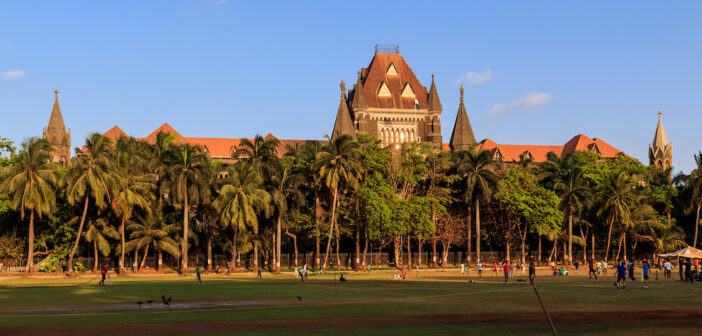In this edition of Court Judgements review, we look at the Supreme Court’s judgement on modification of Award of Arbitration; Power of Court to review the working of statutes; treating unemployed husband as partially dependent in accident claims, Bombay High Court on Organ Transplant as a facet of Right to Life, and Andhra Pradesh High Court on the applicability of SC/ST act to Christian Converts.
Supreme Court: Court has a limited power under Sections 34 and 37 of the Arbitration and Conciliation Act 1996 Act to modify the arbitral award
In a significant ruling, the Supreme Court of India, by a 4:1 majority, held that appellate Courts have limited powers to modify arbitral awards while exercising powers under either Section 34 or 37 of the Arbitration and Conciliation Act, 1996.
The case was referred from a three-judge bench to a five-judge bench, and the fulcrum of the issue was “Are Indian courts jurisdictionally empowered to modify an arbitral award? If so, to what extent?”
The controversy arises because the Arbitration and Conciliation Act, 1996, does not expressly empower courts to modify or vary an arbitral award. Section 34 of the 1996 Act only confers upon courts the power to set aside an award. Nevertheless, this Court, on several instances, has been compelled to modify arbitral awards, seeking to minimise protracted litigation and foster the ends of justice. In contrast, some judgments have posited that Indian courts cannot modify awards, due to the narrowly defined scope of Section 34. Therefore, divergent and contrasting judicial opinions exist on this question.
From the previous catena of judgments, it has been consistently held that the arbitral tribunal is the master of evidence. The scope of judicial intervention under Section 34 is confined to the limited grounds expressly provided therein. The Court does not possess the power to correct errors of fact, reconsider costs, or engage in a review of the merits of the arbitral award.
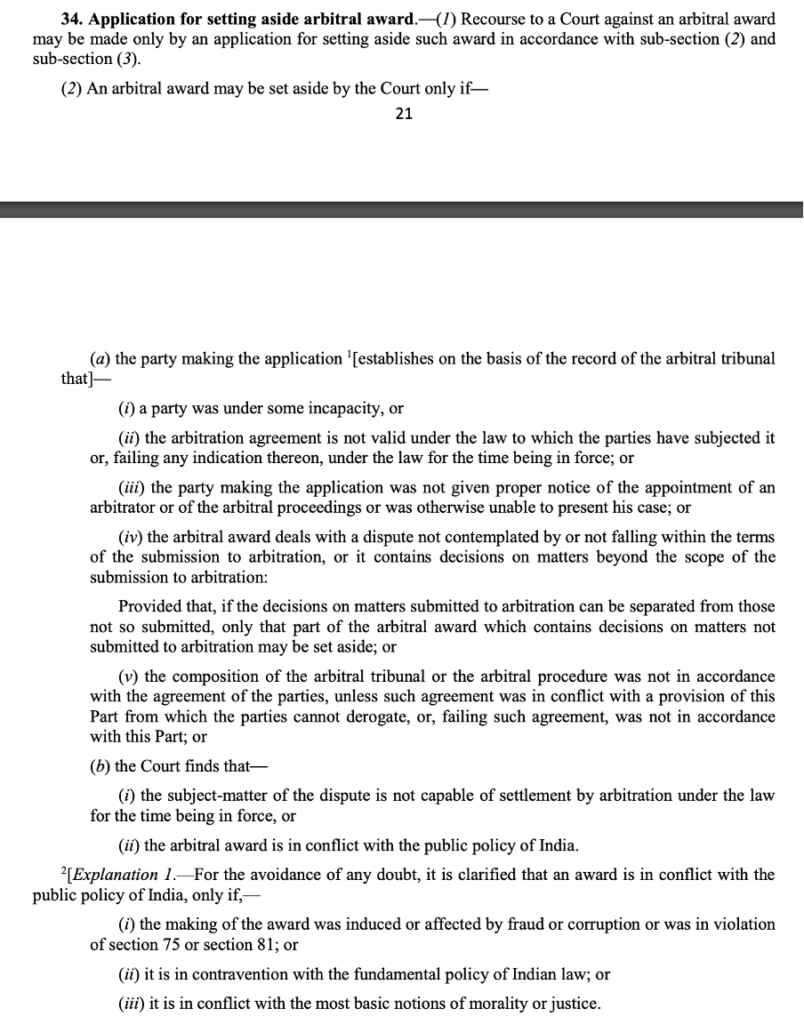
In favour of the court’s modification of the arbitral award, reliance is placed on the word ‘recourse’ used in Section 34. It is broader in scope, and it can include any action to enforce a right. Thus, the recourse to set aside an award includes within its ambit the recourse to modify or vary it. It is contended that the power to grant, reduce, or increase interest should be read into Section 34, without requiring the parties to go through a fresh arbitration process.
Against the modification of awards by courts, the arguments included that the modifications by courts could undermine arbitrational jurisprudence, and result in international repercussions when awards are sought to be enforced under foreign conventions. Further, the exercise of any modification would lead to the courts adopting appellate powers, and modification powers would be contrary to both the express language and the intent behind Section 34 of the 1996 Act.
Considering the arguments from all parties, the Court held that the proviso to Section 34(2)(a)(iv) is particularly relevant. It states that if the decisions on matters submitted to arbitration can be separated from those not submitted, only that part of the arbitral award which contains decisions on matters not submitted may be set aside.

The authority to sever the “invalid” portion of an arbitral award from the “valid” portion, while remaining within the narrow confines of Section 34, is inherent in the court’s jurisdiction when setting aside an award. The authority to set aside an arbitral award necessarily encompasses the power to set it aside in part, rather than in its entirety. The power of partial setting aside should be exercised only when the valid and invalid parts of the award can be clearly segregated, particularly in relation to liability and quantum and without any correlation between valid and invalid parts.
On the limited powers of modification, the Court held that the core principium of arbitration, an Alternative Dispute Resolution mechanism, is to provide a quicker and cost-effective alternative to courtroom litigation. To deny courts the authority to modify an award, particularly when such a denial would impose significant hardships, escalate costs, and lead to unnecessary delays, would defeat the raison d’être of arbitration.
Given this background, if it were to decide that courts can only set aside and not modify awards, then the parties would be compelled to undergo an extra round of arbitration. This would render the arbitration process more cumbersome than even traditional litigation.
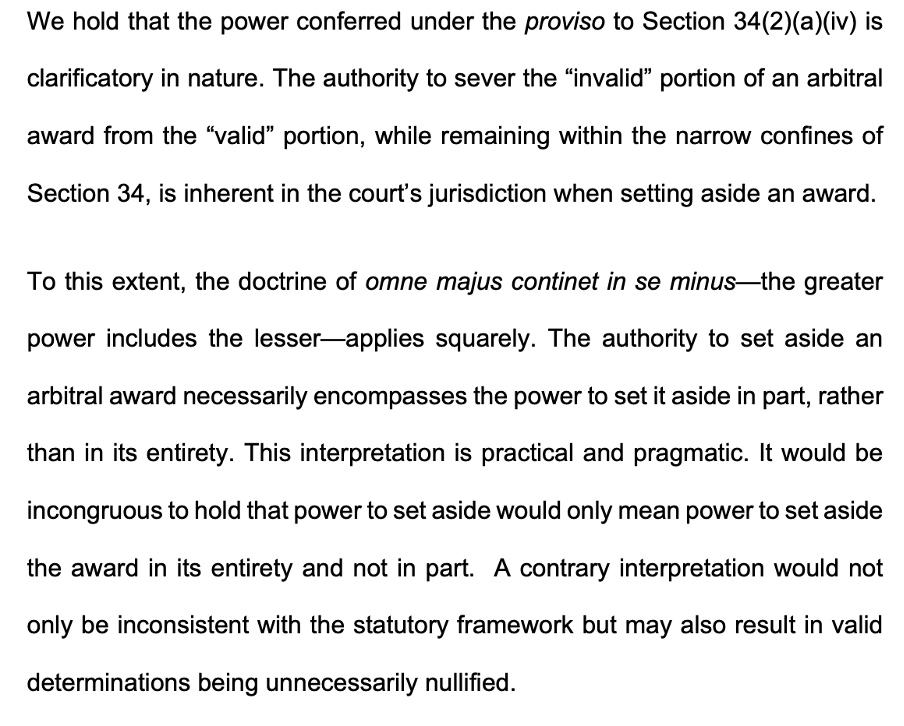
Further, on the issue of exercising power under Article 142, it is held that the power can be exercised where it is required and necessary to bring the litigation or dispute to an end. Not only would this end protracted litigation, but it would also save parties’ money and time.
Supreme Court: Reviewing and assessing the implementation of a statute is an integral part of Rule of Law.
In Rutu Mihir Panchal and others vs. Union of India and others, the Supreme Court held that the Executive branch has a constitutional duty to ensure that the purpose and object of a statute are accomplished while implementing it. Reviewing and assessing the implementation of a statute is an integral part ofthe Rule of Law.
The Apex Court was hearing a writ petition and a civil appeal challenging the Constitutionality of Sections 34(1), 47(1)(a)(i) and 58(1)(a)(i) of the Consumer Protection Act, 2019 prescribing pecuniary jurisdictions of the district, state and national commissions on the basis of value of goods and services paid as consideration, instead of compensation claimed. The writ petitioner’s husband purchased a Ford Endeavour Titanium from an authorised dealer for ₹31.19 lakhs. On 20 November 2018, the vehicle caught fire while being driven, resulting in his death. While criminal proceedings followed, the petitioner filed a consumer complaint under the Consumer Protection Act, 2019, before the District Commission in Vadodara, seeking ₹51.49 crores in compensation. She later approached the Supreme Court under Article 32, contending that the 2019 Act compelled her to approach the District Commission, whereas under the repealed 1986 Act, she could have directly approached the National Commission based on the claim amount.
In a separate civil appeal matter, the petitioner also claimed ₹14.94 crores under a Lions International Club insurance policy after her husband died of COVID-19 on 25 July 2020. The National Commission rejected the claim, holding that the policy consideration did not meet the ₹10 crore jurisdictional threshold.
The Counsels for petitioners argued that there is no rationale for introducing the new criterion for determining the pecuniary jurisdiction. The new criterion is also discriminatory as consumers who claim identical compensation, but have paid different considerations at the time of purchase of goods or services, are treated differently. The counsel for the State argued that provisions are based on reasonable classification and that they were brought in to prevent exaggerated and inflated claims.
The Court summarised the arguments and framed the following issues for consideration.
- Power to determine pecuniary jurisdiction
- Reasonable classification under Article 14
On the Power to determine pecuniary jurisdiction, the Apex Court held that there can be no doubt about the legislative competence and the power of the Parliament to prescribe limits of pecuniary jurisdiction of courts and tribunals and in this case, the district, state or national commissions.
On the issue of reasonable classification under Article 14, it is held that there is no unrestricted claim for compensation and that it is subject to the determination of the court, we hold that classification of claims based on value of goods and services paid as consideration has a direct nexus to the object of creating a hierarchical structure of judicial remedies through tribunals.
On the issue of performance audit of any statute, the Apex Court held that the Executive has the duty to closely monitor the working of a statute and must have a continuous and real-time assessment of the impact that the statute is having.
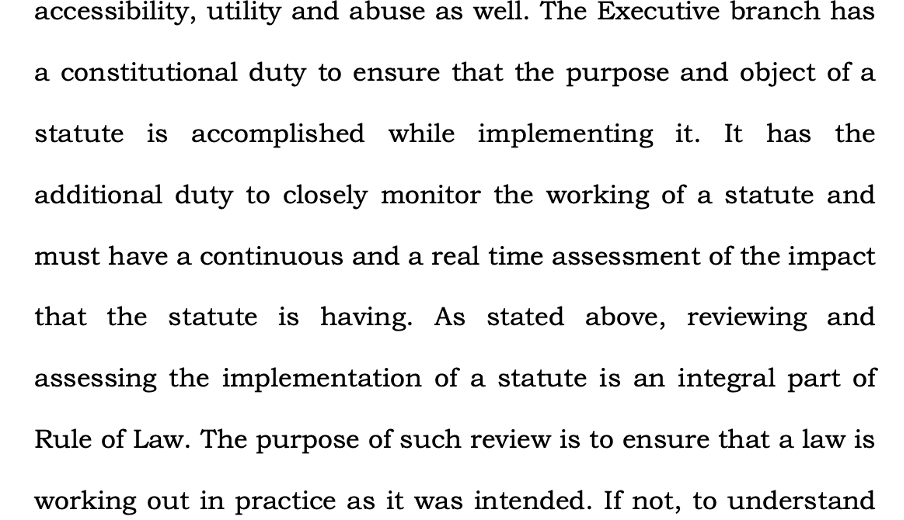
On reviewing the working of statutes, the Apex Court held that the power of judicial review in matters concerning implementation of policy objectives should transcend the standard power of judicial review to issue writs to perform statutory duty and proceed to examine whether the duty bearers, the authorities and bodies are constituted properly and also whether they are functioning effectively and efficiently.
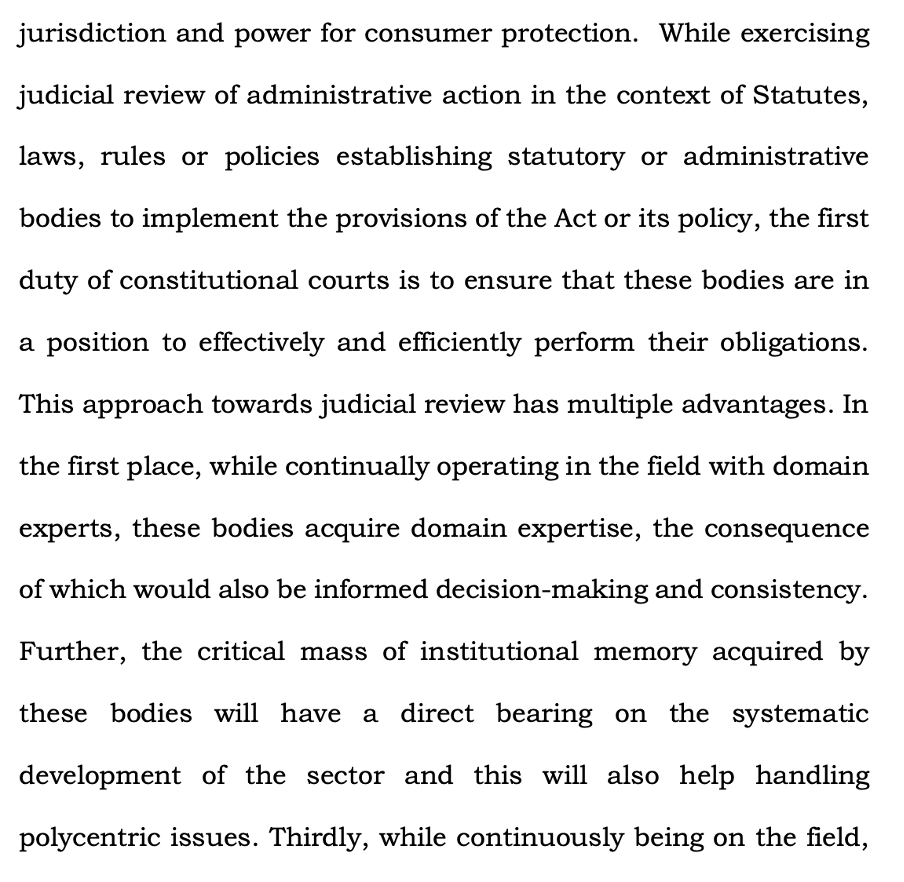
Accordingly, the Court held that sections 34, 47 and 58 of the 2019 Act are constitutional and are neither violative of Article 14 nor manifestly arbitrary. The petitions were disposed of.
Supreme Court: Unemployed Husband can be considered as at least partially dependent on Wife’s income
In Sri Malakappa & Ors. vs. The Iffco Tokio General Insurance Company Limited & Anr., the Supreme Court held that in the absence of specification of any employment of the husband, it can be presumed that he was at least partially dependent on his wife’s income.
The two-judge bench comprising Justice Sudhanshu Dhulia and Justice K. Vinod Chandran was hearing an appeal against the judgment of Tribunal that fixed the compensation to be awarded to the deceased wife. The appellant, who was the original claimant before the Motor Accidents Claims Tribunal, sought compensation for the death of his wife. The claim arose from a road accident on 22 February 2015, in which the deceased, riding pillion on a motorcycle, sustained fatal injuries and passed away two days later, on 24 February 2015.
Before the Tribunal, the claimants contended that the deceased was employed as a Coolie, earning ₹15,000 per month. The Tribunal, however, in the absence of documentary evidence and given the unspecified nature of the work, assessed her income at ₹7,000 per month. Deducting one-third of this amount towards personal expenses and noting that the husband was not financially dependent on the deceased, the Tribunal considered only the two children as dependents. Applying a 50% addition for future prospects and a multiplier of 16 (based on the deceased’s age of 35), the Tribunal assessed the loss of dependency at ₹13,44,000. Additional amounts under other heads brought the total compensation to ₹18,81,966.
When this was challenged by the insurance company, the High Court affirmed the Tribunal’s finding of negligence and held the insurer liable. On the issue of dependency, the High Court agreed with the Tribunal’s view that the husband, though a legal heir, was not a dependent given his age (40 years) and physical ability. The High Court enhanced the income of the deceased to ₹8,000 per month but retained the one-third deduction towards personal expenses, treating the deceased and two children as the dependent family unit.
The Supreme Court, however, observed that in the absence of evidence regarding the husband’s employment, it could not be conclusively assumed that he was not at least partially dependent on the deceased. Accordingly, the Court held that the family should be considered a unit of four members, warranting a deduction of only one-fourth towards personal expenses.
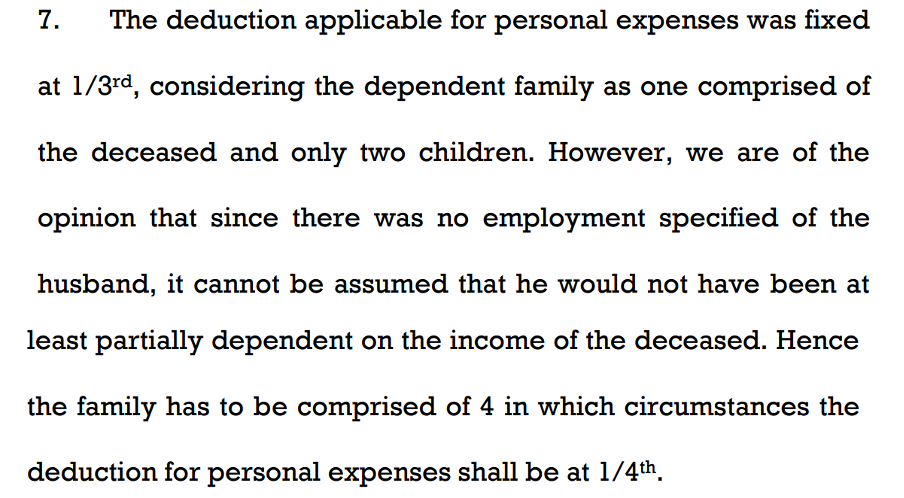
With respect to future prospects, the Tribunal had awarded a 50% addition, which the High Court deleted. Citing the Constitution Bench judgment in National Insurance Co. Ltd. vs. Pranay Sethi, the Court held that self-employed persons below the age of 40 are entitled to a 40% addition for future prospects. The multiplier of 16 was found appropriate.
The Court also noted that the Tribunal had awarded ₹15,000 each towards loss of estate and funeral expenses, and ₹40,000 towards loss of consortium. Relying on New India Assurance Co. Ltd. vs. Somwati, the Court clarified that the award of consortium is not limited to the spouse alone but extends to children and parents as well. Further, it held that each child was entitled to ₹40,000 under this head. No separate amount was permitted under the head of “loss of love and affection,” as that would result in duplication.
Although the claimants had not appealed the Tribunal’s order, the Court justified the modifications on the ground that what is ultimately to be awarded is “just compensation,” as laid down by the Constitution Bench. The Court emphasised that the revised compensation does not exceed the total amount originally awarded by the Tribunal but merely adjusts individual components in accordance with settled legal principles.
Accordingly, the petition is disposed of.
Bombay High Court: Human need for an organ transplant is directly a facet of right to life as guaranteed under Article 21 of the Constitution of India
In Harshad Bhoite vs. State of Maharashtra, the Bombay High Court held that human need for an organ transplant is directly a facet of right to life as guaranteed under Article 21 of the Constitution of India and the provisions of the Transplantation of Human Organs and Tissues Act, 1994 Act would be required to be construed and considered, while recognizing the right to life of a patient.
The petition raises a unique issue under the Transplantation of Human Organs and Tissues Act, 1994, concerning the denial of registration for a pre-emptive kidney transplant. The petitioner, diagnosed with Stage V Chronic Kidney Disease (CKD) due to polycystic kidney disease, is not yet on dialysis but anticipates the need for a transplant. The petitioner sought cadaveric donor registration, which was denied by the Zonal Transplant Coordination Centre, Pune, citing the “Allocation Criteria for Deceased Donor Kidney Transplant Guidelines,” requiring patients to be on maintenance dialysis for over three months.
The petitioner’s contention is that in the near future he would certainly need a kidney transplant, and it is just a question of time. It is his contention that at the time when the need for a kidney transplant becomes absolutely necessary, he should not be put to a prejudice and/or an unwarranted ordeal of being required to wait in a long queue for a transplant, for want of timely registration.
Challenging this, the petitioner argued that such a condition unreasonably delays registration and potentially endangers patients who will imminently require a transplant. He contended that the right to life under Article 21 encompasses timely access to organ transplantation, and that the guidelines cannot override the 1994 Act.
The petitioner’s counsel argued that there has to be some mechanism by which the category of patients in which the petitioner falls, need to be recognized and more particularly, being patients who would be in imminent need of kidney transplant, so that their names as per seniority (as per date of the application) as contained in such list, can be considered and recognized to be shifted in the list of already registered candidates, whenever the urgency of a transplant occurs.
The Court held that the guidelines cannot supersede the Act, and therefore must be interpreted in line with the Act’s objectives and constitutional rights. It observed that patients who are not on dialysis but are medically certain to require a transplant soon should not be excluded from registration. When the health and life of such a stage of the patient themselves are rendered delicate and worrisome, any procedure for such a basic requirement of registration needs to be of absolute ease and comfort.
The Court directed the authorities to explore the possibility of a separate registration mechanism for such patients, enabling their inclusion on the waiting list based on medical certification when the need becomes urgent.
Andhra Pradesh High Court: Only a person belonging to Scheduled Caste and Scheduled Tribe can invoke the provisions of SC, ST (Prevention of Atrocities) Act 2015.
In Akkala Rami Reddy vs. State of Andhra Pradesh, the petitioners/ accused in Spl. S.C. No. 36 of 2021 before the IV Additional District and Sessions Judge-cum-SC & ST Court, Guntur, sought quashing of criminal proceedings initiated under Sections 3(1)(r), 3(1)(s), 3(2)(va) of the SC/ST (Prevention of Atrocities) Act, 2015, and Sections 341, 506, 323 read with 34 of IPC. The case was based on a complaint filed by the second respondent, a self-identified Pastor, who alleged that he was subjected to caste-based abuse and threats during and after Sunday prayer meetings in Pittalavanipalem village, culminating in a physical assault on 24 January 2021. The petitioners contended that the invocation of the SC/ST Act was invalid as the de facto complainant had converted to Christianity and was functioning as a Pastor for over a decade. They relied on Chinni Appa Rao vs. State of A.P., where the Andhra Pradesh High Court held that individuals who have converted to Christianity cannot claim Scheduled Caste status for the purposes of protection under the SC/ST Act. Referring to the Constitution (Scheduled Castes) Order, 1950, which limits SC status to those professing Hinduism (and later Sikhism and Buddhism), the petitioners argued that the complainant’s continued religious identity as a Christian disentitled him from invoking the provisions of the Act.
Conversely, the second respondent’s counsel cited Kurapati Maria Das vs. Dr. Ambedkar Seva Samajan, wherein the Supreme Court disapproved of a roving inquiry into an individual’s caste in writ jurisdiction and emphasised the role of competent authorities in determining caste status under the Regulation of Issue of Community Certificates Act, 1993. It was further submitted that the complainant held a valid caste certificate identifying him as Hindu-Madiga, a Scheduled Caste.
The Court, however, upon examining witness statements under Section 161 CrPC, noted that the complainant consistently identified and functioned as a Pastor within the local Christian community. Given this factual matrix, the Court held that the complainant, having professed Christianity for over ten years, could not claim the benefits of the SC/ST Act, which are reserved for those who continue to belong to the Scheduled Castes as recognised under the 1950 Order. The court held that only a person belonging to the Scheduled Caste and Scheduled Tribe can invoke the provisions of the SC, ST (Prevention of Atrocities) Act. Mere non-cancellation of the caste certificate by the authority to a person who has converted into Christianity cannot instil the protection granted under this Protective Legislation.
Observing that the essential requirement under Section 3 of the Act was not met, the Court concluded that allowing prosecution under the SC/ST Act would amount to an abuse of process and accordingly quashed the proceedings against the petitioners.


